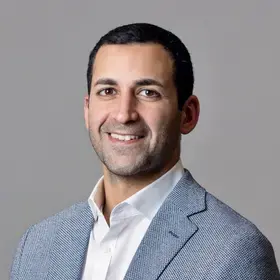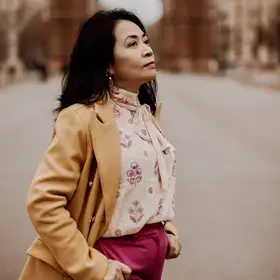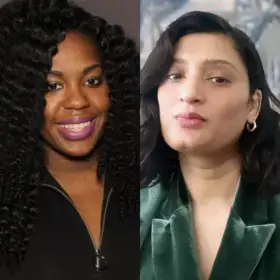Arya Jemal (’23SPS), Sustainability Management alum and graduate teaching assistant—and Fulbright scholarship recipient—applies the skills she acquired in her program to her wide array of projects.
Those include work ranging from consulting for C40 Cities Finance Facility to transforming abandoned barges in NYC into wetland habitats. She is a full-time Deckhand on the tall ship Pioneer and tugboat W.O. Decker out of the South Street Seaport Museum. Jemal was also a SUMA capstone project manager and won third place in Columbia’s Hacking for Humanity competition.
As part of her Fulbright work, Jemal will soon embark on a nine-month independent project doing agriculture research in Armenia. Specifically, “climate resiliency of women-led agricultural cooperatives.” The ultimate goal: to help “women farmers in Lori Province combat the impacts of the climate crisis by identifying the practices that best improve environmental, economic, and social conditions.”
In this interview, Jemal discusses how her professors and courses at Columbia SPS helped her discover and develop the research topic that led to her receiving a Fulbright.
Tell us about your background and what drew you to the M.S. in Sustainability Management.
I have a B.A. in environmental studies and political science from Swarthmore College as well as a Certificate in city planning from UC Berkeley College of Environmental Design, so I already had an affinity for sustainability before joining the SUMA program.
My professional background prior to joining SUMA was mostly in environmental education and nonprofit work, with additional experience in sustainable food systems and ag-tech. I really liked the breadth of the M.S. in Sustainability Management program and felt it would help me pivot my career away from nonprofits and into fields like renewable energy and greenhouse gas (GHG) emissions accounting.
The range of expertise among the professors and within the course offerings drew me to the SUMA program. I can say with confidence that I walk away from the SUMA program with concrete skills that I can take into a number of fields, including solar, sustainable urban design, sustainable finance, and geographic information systems (GIS), to name just a few.
Were there any classes, professors, or networks that stood out to you as particularly helpful?
Three classes stand out to me: Urban Ecology, Solar Project Development, and Sustainable Agriculture.
Urban ecology is a field I had always been interested in, so Professor Amy Karpati’s class on Urban Ecology really exposed me to the possibilities that abound when designing sustainable cities.
The Solar Project Development course taught by Professor Dan Giuffrida helped me walk away with the most directly transferable skills and knowledge to begin working in the industry immediately. Thanks to Professor Giuffrida, I was able to work in the industry as a consultant and designer of residential photovoltaic systems. Professor Giuffrida’s class absolutely prepared me to work in solar and helped me stand out as a candidate in the industry.
I would be remiss if I didn’t mention Professor Bruce Kahn’s Sustainable Agriculture course. Because of his knowledge of the subject and the course matter, I found a research topic I was passionate about. With Professor Kahn’s help and support, I applied for a Fulbright research grant.
Tell us about your capstone and how your team approached the project. Who did you work with, and what were you trying to solve?
My capstone project client was the C40 Cities Finance Facility (CFF), a partner organization of C40 Cities. The main “ask” from our client was to quantify the total number of people benefiting from specific climate adaptation projects in Medellín, Colombia; Salvador, Brazil; and Cape Town, South Africa.
The purpose of quantifying the total number was to help close the private financing gap for adaptation projects that exists because it is often difficult for adaptation projects to display clear and measurable benefits. Our team’s approach to the project was to utilize case studies to develop a comprehensive methodology for quantifying the total number of people benefiting within three climate indicators: flooding, heat, and waterborne illnesses.
We developed methodologies for each climate indicator and were able to present to the client a total number of people benefiting from a reduction in flooding, urban heat island effect, and waterborne illnesses from the respective adaptation projects in Medellín, Salvador, and Cape Town. The methodologies and calculations we put together can now be used with CFF’s network of mayors working on climate adaptation projects. They are complex enough to help make the case for adaptation projects to private financiers but are simple enough that city officials can utilize our methodologies to calculate a total number of people benefiting within their own city and adaptation project.
Our faculty advisor Susanne DesRoches was central in helping us define the scope and plan of attack for our capstone project, particularly as our project delved into a newer field within climate financing and adaptation.
Tell us about your upcoming Fulbright scholarship. What will you be researching? What are you hoping to achieve?
Starting in September, I will be researching the climate resiliency of women-led agricultural cooperatives in Lori Province. My project aims to understand the impacts of women-led cooperatives on the landscape and community and whether they implement any novel practices that make them more climate-resilient than their conventional counterparts. While in Lori Province, I will be spending time on the Vardablur Women’s Agricultural Cooperative as well as conventional farms throughout the province—and will compare the practices done on the Vardablur cooperative with those done on conventional farms in the area.
I will be splitting my research time between the capital of Yerevan, Armenia, and Lori and will be working with Armenia Tree Project to complete my research.
My hope is for my work to aid women farmers in Lori Province in combating the impacts of the climate crisis by identifying the practices that best improve environmental, economic, and social conditions. Implementation of these best practices will strengthen food security while reducing vulnerability to the climate crisis. Additionally, my research will uplift women spearheading unique practices in Armenia’s agricultural sector. I’m excited to spend the next year in Armenia and will absolutely be using the skills gained from the SUMA program in my research!
About the Program
The Columbia University M.S. in Sustainability Management provides students cutting-edge policy and management tools they can use to help public and private organizations and governments address environmental impacts and risks, pollution control, and remediation to achieve sustainability. The program is customized for working professionals and is offered as both a full- and a part-time course of study.


